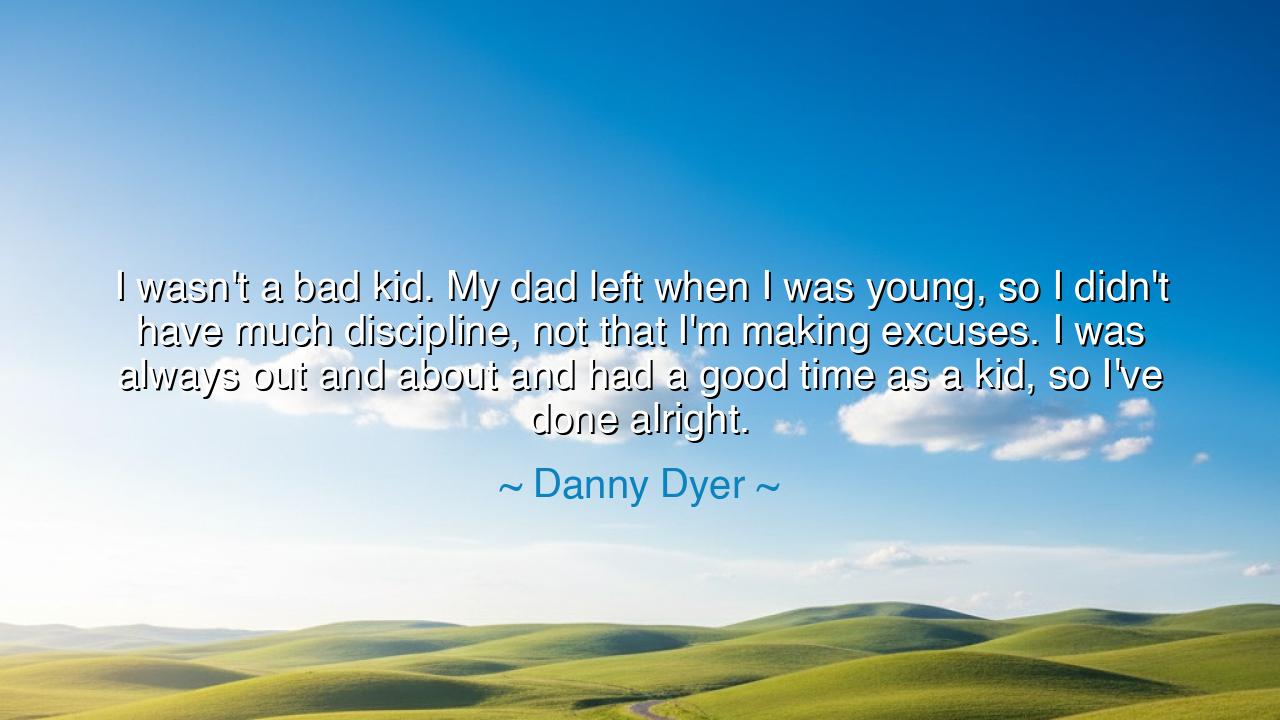
I wasn't a bad kid. My dad left when I was young, so I didn't
I wasn't a bad kid. My dad left when I was young, so I didn't have much discipline, not that I'm making excuses. I was always out and about and had a good time as a kid, so I've done alright.






In the words of Danny Dyer, “I wasn’t a bad kid. My dad left when I was young, so I didn’t have much discipline, not that I’m making excuses. I was always out and about and had a good time as a kid, so I’ve done alright.” These words, though spoken plainly, hold a quiet depth — the voice of a man who has wrestled with the past and found peace in its imperfection. Beneath the casual tone lies the story of loss, resilience, and redemption, the eternal story of those who grow up without guidance yet find their own way to the light. Dyer’s words speak not of bitterness, but of acceptance; not of excuses, but of understanding. He teaches that the human spirit can survive the absence of structure when it is sustained by joy, courage, and a refusal to surrender to despair.
The origin of this quote lies in Dyer’s reflections on his upbringing in the East End of London — a working-class world of toughness and survival. His father’s departure left a void where discipline and direction might have been, and like many children in such circumstances, Dyer was left to shape his own moral compass. Yet he does not curse his past. He acknowledges the difficulty, the lack of control, but he also honors the freedom and vitality of his youth. He calls himself not “a bad kid,” but a kid who “was always out and about,” alive to the world around him. This balance — between loss and laughter, between struggle and spirit — is the foundation of his truth: that even when guidance is absent, the heart can find its way through experience and self-discovery.
When he says he had “not much discipline,” he touches on a wound common to many — the absence of a father’s hand, the lack of a steady voice to correct and protect. Yet rather than dwell on the pain, he transforms it into a story of growth. For those who rise without guardianship learn to become their own teachers. The discipline that comes from hardship is not gentle, but it is lasting. Dyer’s words remind us that the world itself can become a father — that the streets, the struggles, the friendships, and the mistakes can all become lessons. Resilience, born of necessity, often replaces the discipline that life withheld.
History offers many examples of such transformation. Consider the story of Abraham Lincoln, whose father was often absent and whose family lived in poverty. Young Lincoln received barely a year of formal education, yet through hunger for knowledge, he became self-taught — reading by firelight, shaping his own destiny through perseverance. Like Dyer, Lincoln could have blamed circumstance, but instead, he turned absence into drive. His lack of privilege became his strength, his empathy born from hardship. So too does Dyer’s story echo this truth — that we are not defined by who leaves us, but by what we choose to become in their absence.
And when Dyer says, “I’m not making excuses,” he speaks with humility — the mark of true wisdom. The ancients would have admired this honesty, for they believed that the noble soul does not seek pity, but understanding. He admits the chaos of his youth without shame, for he recognizes that life’s imperfections are often the forge of character. There is a kind of grace in his words, the grace of a man who has accepted his past, learned from it, and moved forward. His spirit carries no resentment, only gratitude for the wildness that shaped him. In that wildness, he found not ruin, but freedom — the freedom to make mistakes, to learn, and to grow.
Yet the quote is not only a reflection on childhood, but a message to all who feel they began life without advantage. Dyer’s voice reminds us that circumstance does not determine destiny. Though some are born into structure and others into chaos, greatness can rise from either. What matters is not how perfect our beginnings are, but how honestly we face them. Those who accept their flaws and learn from their pain are often stronger than those who never knew struggle. For the soul that has wandered without guidance often learns the most precious truth of all: how to guide itself.
The lesson, then, is one of acceptance, gratitude, and perseverance. Do not curse your hardships, nor the absences in your life. Do not dwell on what was withheld, but use what was given. If you lacked discipline, find strength in curiosity. If you lacked protection, find wisdom in survival. If you lacked guidance, create your own path — and forgive those who could not walk it with you. Dyer’s story shows that even those who grow in broken soil can bloom fully, and that laughter, courage, and authenticity can heal wounds deeper than words.
So, my children of the present age, remember this: life does not promise fairness, but it does offer opportunity. Do not measure your worth by what you lacked in youth, but by what you have made of it now. As Danny Dyer teaches through his humble honesty, even when discipline is absent, love of life can carry you forward. And when you look back, as he does, may you too be able to say with peace and quiet pride: “I’ve done alright.”






AAdministratorAdministrator
Welcome, honored guests. Please leave a comment, we will respond soon